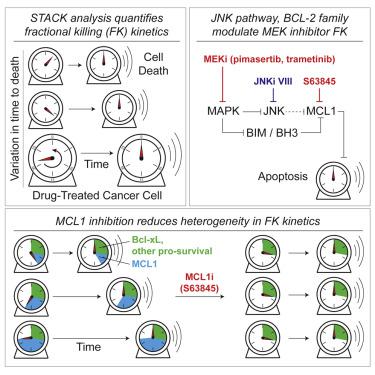Cell Reports ( IF 7.5 ) Pub Date : 2020-07-07 , DOI: 10.1016/j.celrep.2020.107845 Zintis Inde 1 , Giovanni C Forcina 1 , Kyle Denton 1 , Scott J Dixon 1

|
Lethal drugs can induce incomplete cell death in a population of cancer cells, a phenomenon referred to as fractional killing. Here, we show that high-throughput population-level time-lapse imaging can be used to quantify fractional killing in response to hundreds of different drug treatments in parallel. We find that stable intermediate levels of fractional killing are uncommon, with many drug treatments resulting in complete or near-complete eradication of all cells, if given enough time. The kinetics of fractional killing over time vary substantially as a function of drug, drug dose, and genetic background. At the molecular level, the antiapoptotic protein MCL1 is an important determinant of the kinetics of fractional killing in response to MAPK pathway inhibitors but not other lethal stimuli. These studies suggest that fractional killing is governed by diverse lethal stimulus-specific mechanisms.
中文翻译:

癌细胞分数杀死的动力学异质性。
致命药物可以诱导癌细胞群不完全细胞死亡,这种现象被称为部分杀死。在这里,我们展示了高通量群体水平延时成像可用于量化对数百种不同药物治疗的并行杀伤分数。我们发现稳定的中等水平的部分杀伤并不常见,如果给予足够的时间,许多药物治疗会导致完全或接近完全根除所有细胞。随着时间的推移,部分杀死的动力学随药物、药物剂量和遗传背景的变化而变化很大。在分子水平上,抗凋亡蛋白 MCL1 是响应 MAPK 通路抑制剂而非其他致死刺激的部分杀伤动力学的重要决定因素。这些研究表明,部分杀伤是由不同的致死刺激特异性机制控制的。











































 京公网安备 11010802027423号
京公网安备 11010802027423号